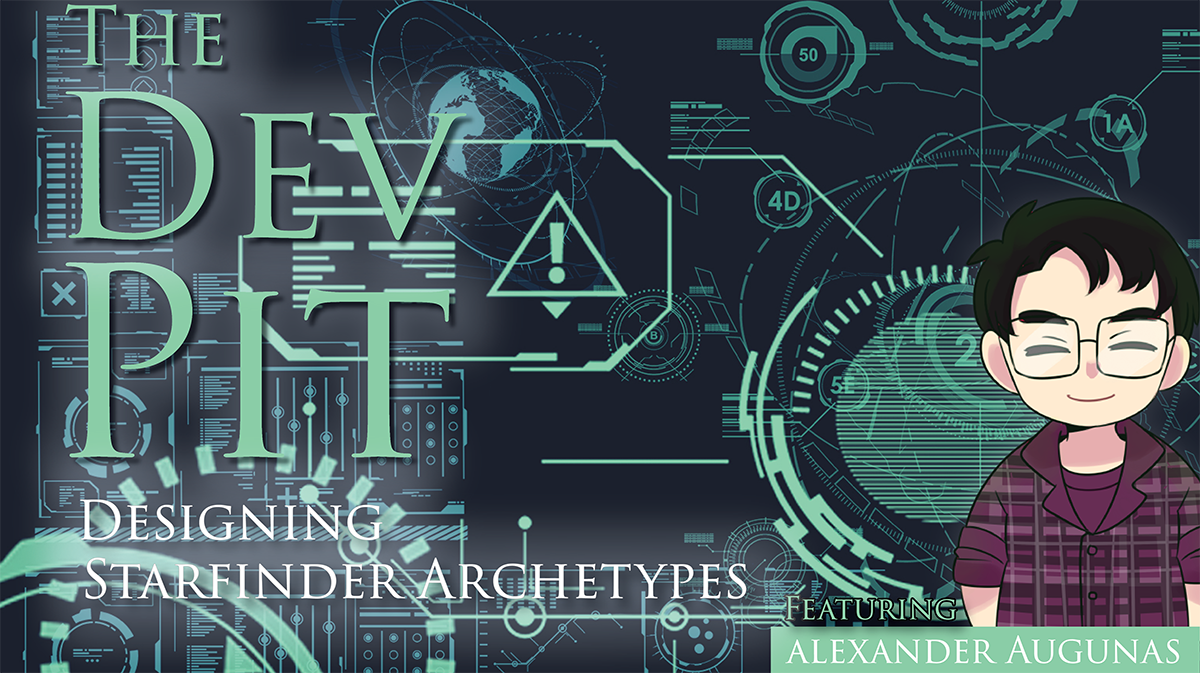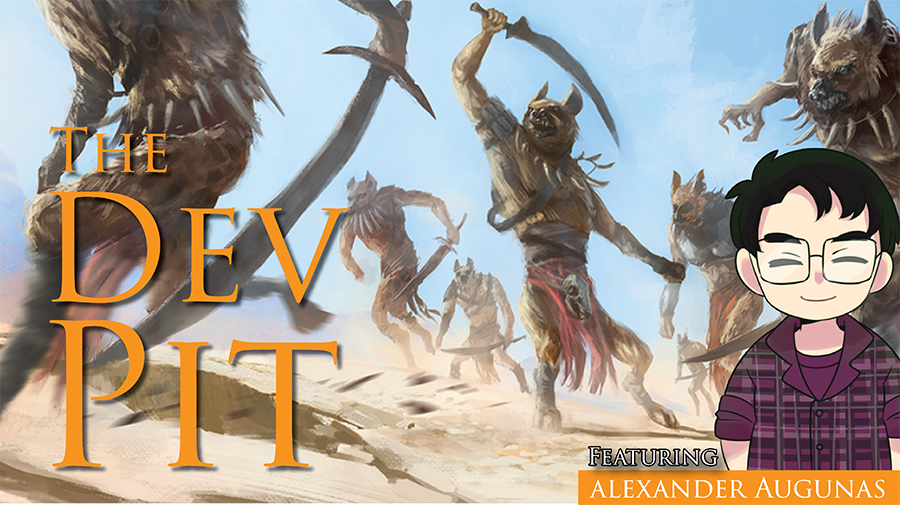Hi everyone, and welcome to Dev Pit! I’m Alex Augunas, the Everyman Gamer, and today I’m talking about languages and why they’re my biggest gripe with Pathfinder Second Edition. I don’t expect this to be a particularly long article, as I think the issue is pretty straight forward. However, I AM going to try and offer a solution for GMs looking to do a little homebrew to make their games run smoother.
Okay, let’s do this!
The Problem with Languages
So, in Pathfinder First Edition languages were pretty easy to acquire. You got a language every time your Intelligence modifier increased, as well as whenever you took a rank in the game’s Linguistics skill. This meant that as you studied languages, you eventually came to learn them. Now, this method had its downsides. Aside from using the skill to learn languages, Linguistics didn’t DO much. It was pretty rare in a published adventure to be told to make a Linguistics check, which is kind of a bummer. In addition, spells like tongues completely nullified languages because you cast the spell once and BOOM. No language, no problem.
Let’s jump a decade to Pathfinder Second Edition. In Second Edition, every ancestry has a list of languages that you automatically know, and you gain one additional language for each point of Intelligence modifier that you have. This is basically the same as in PF1, so no harm, no foul. The biggest difference is the application of the rarity system to languages, which gives a hard “this is the list of languages available to you” mechanic. Of a larger note, the Linguistics skill is gone, so how does one learn languages in Pathfinder Second Edition.
Aaaaaand here comes the problem.
In Pathfinder Second Edition, the only way to gain new languages outside of increasing your Intelligence score is to take a skill feat called Multilingual. The Multilingual skill feat grants you 2 languages every time you take it, and it can be taken multiple times. That is kind of a huge problem, as Multilingual requires being trained in the Society skill, which is honestly more of a sacrifice than simply allocating one skill rank to a Linguistics skill. Take the barbarian for example. If you’re an Int 10 barbarian who needs to know a specific language, sure, that’s going to take 25% of your total skill ranks at 1st level, but your total number of skill ranks is quadratic. It’s 1/4 at 1st level, 1/8th at 2nd level, 1/12th at 3rd level, and so on. Skill increases aren’t as forgiving. A barbarian gets training in 3 skills from their class at 1st level, plus 2 additional skills from their background. (One of those skills is a mandatory Lore skill.) That means that at 1st level, Society is 1/5 of your total skills, which is smaller at first. But a barbarian only gets additional skill increases at odd levels, so its 1/5 at 2nd level, 1/6 at 3rd level, 1/6 at 4th level, and so on. This isn’t including the fact that you need to use your skill increases to improve your proficiency rank, so when you get right down to it, Pathfinder Second Edition doesn’t support dabbling in skills the way that First Edition did. While this forced specialization is a boon for most skills, it definitely hurts everyone’s ability to learn languages, and that’s before we talk about the issue of languages being tied to skill feats.
Without skill feats, Pathfinder Second Edition’s skills are EXTREMELY limited in what they can do. Most skills don’t have much more than 3 or 4 skill actions baseline, and most actions are designed to be really underwhelming without expansion via skill feat. Most skill feats actively affect what your character can or cannot do. So when you’re looking at Multilingual, you’re basically asking a player if they’re okay giving up a fun, active ability like Quick High Jump for the ability to speak a few more languages. And this is tough, because to a certain extent if you can’t speak a language, your ability to RP with another person is extremely limited. Pantomiming is literally a Legendary skill feat for the Society skill, after all. (See Legendary Linguist, which is a 15th level feat that allows you to pantomime.) Allowing the players to develop a quick pidgin to communicate with things they can’t speak with is normally fine, but in the case of Pathfinder Second Edition allowing this literally cheapens the power of a feat, and by creating this feat Paizo has basically said that pantomiming effectively is something that you need to have a legendary grasp of Society to understand.
Pantomiming, literally communicating with gestures, requires … legendary … Society?
Well, maybe you’re thinking to yourself that, “Hey, I’ll just use tongues to ignore all of this. No big deal!” Well, tongues is GONE. It’s now a heighten effect of the comprehend languages spell, and only allows you to auto-translate one language per casting. Also, it only works for 1 hour. At low-levels, this is a buff to duration (PF1 tongues lasts 10 minutes per level, and as a 3rd level spell that means it would normally last about 50 minutes). But as you can plainly see, a 7th level caster in PF1 has a longer tongues then that same caster in PF2 does, and the spell works for all languages you encounter during that hour and 10 minutes.
No matter what way you look at it, all methods of contacting new languages were nerfed HARD in PF1.
The (Likely) Justification
So, you might be wondering to yourself, “Why would language access get hit so hard in Pathfinder Second Edition? The likely reason is that it was SUPER easy to be a multilingual god in Pathfinder 1st Edition, and the design team wanted to convey the difficulty one faces when learning a new language.
The thing is, in the real world people don’t learn a language instead of learning a new skill, especially when they’re learning language by immersing themselves in it. When you’re forced to sit down and study a language, yeah, that’s hard and time consuming. But if you’re immersed in a language, if you’re hearing it all the time and someone is actively trying to help you learn it, you start to pick bits and pieces of it up on your own. While it’s true that as children our brains are far more plastic and receptive to language acquisition, the human brain is literally hardwired for learning language from others. When you’re taking French 101 in college or whatever, you’re not really immersed in the language. You’re studying bits and pieces of French for about an hour a day, maybe two hours if you’re also working on homework or something. But when you’re fully immersed in a language and learning from a native speaker, studies show that process is much faster.
When we’re talking about Pathfinder RPG characters, the truth of the matter is that our characters are more likely to acquire language by immersing themselves in far-off cultures as opposed to studying in a classroom. Therefore, the system of language acquisition that we have in this game is unfun and not particularly realistic for the time period portrayed.
A Solution
So, you know me. I don’t like to leave a problem without a solution. So here you go, a new skill task for the Society skill that can be used untrained.
Learn a Language
| Concentrate || Downtime |
You can acquire a new language, allowing you to speak and understand it fluently. To Learn a Language, you must meet the following requirements:
- The language is a Common language or is an Uncommon or Rare language that is readily available to you. For instance, Gnoll is ordinarily an Uncommon language, but the GM could allow you to learn it if you are spending your downtime in a place with a lively Gnoll population where you’d either be exposed to the language and others are willing to teach it to you.
- The language is not a secret language, such as Druidic.
You must spend 7 days either immersed in an area where people speak the language, or learning the language from a native speaker. These days don’t need to be consecutive, but if you go a number of days exceeds the number of days of immersion or tutelage that you’ve received, the entire week is ruined and you have to start over. For example, if you spend 3 days immersed in the Gnoll language then go explore a dungeon for 4 days, the 3 days you spent learning Gnoll are wasted and you have to start over in order to properly learn to speak Gnoll.
After you’ve spent 7 days immersed in the language or learning it from a native speaker, you attempt a Society check. The DC is usually 13 for most languages, but the GM can increase or reduce the DC based on whether you now a similar language, how difficult the language is to learn, and other factors. Most Common languages require 120 days to learn to speak proficiently (i.e. convey simple ideas and hold a simple conversation) and 240 days to speak fluently. When you learn to speak a language proficiently, you can use abilities with the linguistic trait, but you take a -4 penalty to attack rolls, skill checks, save DCs, and skill DCs that possess this trait. When you learn to speak a language fluently, you can use abilities with the linguistic trait without penalty and have fully mastered the language.
Critical Success Your attempt is successful. You earn 7 days towards the total number you need to become fluent in the language.
Success Your attempt is successful. You earn 3 days towards the total number you need to become fluent in the language.
Failure You fail to learn the language. You don’t earn any days towards becoming fluent in the language.
Critical Failure You fail to learn the language. You don’t earn any days towards becoming fluent in the language, and if you’ve already earned any days towards the language you lose 1d6 of them as you encounter a stumbling block that sets back your understanding of the language.
And for good measure, here’s a revision of the multilingual feat.
Multilingual
| General || Skill |
Prerequisites trained in Society, must know at least 2 languages.
Your familiarity with learning languages has allowed you to quickly grasp new ones. When you Learn a Language, you treat a critical failure as a failure, a failure as a success, and a success as a critical success. If the result of your Society check to Learn a Language exceeds the DC by 10 or more, you earn 8 days towards the total number you need to become fluent in the language, plus a number of additional days equal to the amount your Society check beat the Society DC by. You double the number of additional days earned in this manner if you’re an expert in Society, triple them if you’re a master in Society, or quadruple them if you’re legendary in Society.
In Conclusion,
Learning Languages in PF2 is currently cost ineffective, forces you to choose between fun options and a literal “gateway to roleplaying”, and doesn’t accurately portray how people learn languages. The alternate rules that I’ve provided you *SHOULD* help with that, but I’m interested to hear your thoughts! Pop on to the Know Direction Discord some time and let me know what you think.
This is Alex Augunas, signing off until next time!

Alexander “Alex” Augunas has been playing roleplaying games since 2007, which isn’t nearly as long as 90% of his colleagues. Alexander is an active freelancer for the Pathfinder Roleplaying Game and is best known as the author of the Pact Magic Unbound series by Radiance House. Alex is the owner of Everyman Gaming, LLC and is often stylized as the Everyman Gamer in honor of Guidance’s original home. Alex also cohosts Know Direction: Beyond with Perram and James Ballod. Follow Alex’s Twitter @AlJAug!







I’m definitely going to be using this